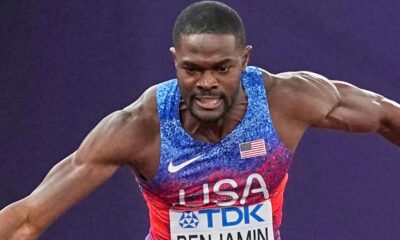Health
Five Effective Workout Supplements Backed by Science

The market for sports supplements continues to grow, with consumers investing billions of dollars annually in products that promise enhanced fitness and performance. Despite the multitude of options available, only a select few have substantial evidence supporting their effectiveness. The International Olympic Committee’s Medical and Scientific Commission recently addressed which supplements are genuinely beneficial for athletes, providing a reliable guide for those seeking legitimate aids in their training.
Understanding the Landscape of Supplements
Exercise is inherently challenging, and the allure of a simple pill to improve athletic capability is strong. However, a significant portion of the products marketed as workout enhancers may contain unlisted and potentially harmful ingredients, including experimental stimulants, steroids, or excessive caffeine. This raises critical concerns about safety and efficacy in the supplement industry. According to a study conducted by the National Institutes of Health, many supplements fail to deliver on their promises, leading consumers to question which products are genuinely effective.
The International Olympic Committee has outlined a brief list of supplements endorsed as beneficial for health and performance. These recommendations represent a consensus among researchers, who often find themselves divided over the merits of various products. Pieter Cohen, a physician and researcher at Harvard Medical School, emphasizes that while these supplements can provide a slight performance boost, they are not magic pills. “There’s not going to be one pill that helps you with pickleball and weightlifting and running a marathon,” he notes.
Top Five Endorsed Supplements
1. **Creatine**: This naturally occurring compound is found in muscle cells and plays a crucial role in energy production during high-intensity exercise. Studies have shown that creatine supplementation can enhance strength, muscle mass, and recovery, making it a popular choice for athletes in various sports.
2. **Caffeine**: Widely recognized for its stimulant properties, caffeine can improve endurance and reduce perceived effort during prolonged physical activities. The International Olympic Committee supports moderate caffeine consumption as a way to enhance athletic performance.
3. **Beta-Alanine**: This amino acid helps buffer acid in muscles, allowing for more extended periods of intense exercise. Research indicates that beta-alanine can improve performance during high-intensity workouts, particularly in activities lasting 1 to 4 minutes.
4. **Branched-Chain Amino Acids (BCAAs)**: Comprising leucine, isoleucine, and valine, BCAAs are essential for muscle recovery and can reduce muscle soreness post-exercise. Their supplementation is particularly beneficial for those engaged in intense training regimens.
5. **Omega-3 Fatty Acids**: Known for their anti-inflammatory properties, omega-3 fatty acids can aid in recovery and support joint health. Regular supplementation may enhance overall physical performance and well-being.
While these supplements can offer advantages in specific contexts, it is essential to approach them with realistic expectations. They are not substitutes for hard work and dedication in training.
The recent emphasis on scientifically backed supplements highlights the need for consumers to be discerning when choosing products to enhance their workouts. As the industry evolves, continued research will be vital in ensuring safety and efficacy in the supplements that athletes choose to consume.
-

 World1 week ago
World1 week agoPrivate Funeral Held for Dean Field and His Three Children
-

 Top Stories2 weeks ago
Top Stories2 weeks agoFuneral Planned for Field Siblings After Tragic House Fire
-

 Sports3 months ago
Sports3 months agoNetball New Zealand Stands Down Dame Noeline Taurua for Series
-

 Entertainment3 months ago
Entertainment3 months agoTributes Pour In for Lachlan Rofe, Reality Star, Dead at 47
-

 Entertainment2 months ago
Entertainment2 months agoNew ‘Maverick’ Chaser Joins Beat the Chasers Season Finale
-

 Sports3 months ago
Sports3 months agoSilver Ferns Legend Laura Langman Criticizes Team’s Attitude
-

 Sports1 month ago
Sports1 month agoEli Katoa Rushed to Hospital After Sideline Incident During Match
-

 World2 weeks ago
World2 weeks agoInvestigation Underway in Tragic Sanson House Fire Involving Family
-

 Politics2 months ago
Politics2 months agoNetball NZ Calls for Respect Amid Dame Taurua’s Standoff
-

 Top Stories2 weeks ago
Top Stories2 weeks agoShock and Grief Follow Tragic Family Deaths in New Zealand
-

 Entertainment3 months ago
Entertainment3 months agoKhloe Kardashian Embraces Innovative Stem Cell Therapy in Mexico
-

 World4 months ago
World4 months agoPolice Arrest Multiple Individuals During Funeral for Zain Taikato-Fox













